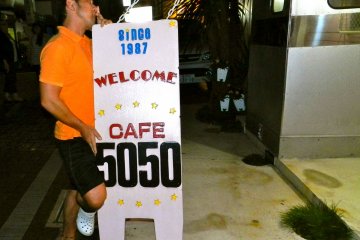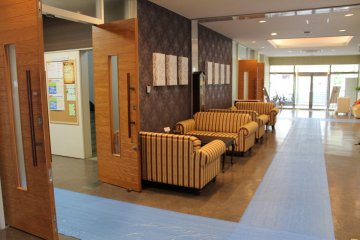If you need a reason to journey south to the Ota ward, away from the typical sights of Tokyo, consider this fact: it is home to close to half of Tokyo’s public baths sourced by natural hot spring water. Most of these baths in Ota have black spring water, or kuro-yu. Lucky for me, one such bath, Nu-land Sagami-yu (ヌーランドさがみ湯) is barely 5 minutes away from my sharehouse, Oakhouse Kamata 260. The nearest station to this public bath is Zoshiki station on the Keikyu Main Line.
If it’s your first experience in a public bath and are unsure of what to do, like I was, fret not. At Nu-land, you can approach the friendly and polite staff directly for instructions. First of all, deposit your shoes at the shoe locker. The ticket to the baths can be bought from a machine at the door or directly at the counter. Entrance to the baths alone costs an affordable 450-yen. As I did not bring my towel from home, I also paid an extra of 150 yen to rent towels from the counter.
Baths are separated into the male and female section. In your respective section, put away your things and all your clothes in an available locker, which costs 100 yen. For a first-timer at the public bath, stripping naked could require stepping over a real psychological barrier. Prior to going, I had plenty of concerns about getting naked in front of other people as well, but I thought to myself, if 80 year-old obaasans are not shy about their own bodies, I shouldn’t be either! Everyone is extremely comfortable about being naked so ignore that spotlight effect and try it!
As tattoos are usually associated with the yakuza (japanese gangs), you’d be wise to hide them, if any. Signs at the entrance clearly state that people with tattoos are not allowed to enter. Tattoos legitimately scare the Japanese people so don’t forget this lest you get turned away.
Nu-land Sagami-yu has four indoor baths, one of them being the kuro-yu. There is also a roten-buro (outdoors bath) with kuro-yu outside. Before stepping into the baths, wash your bodies clean at the washing area, where there are sitting stools, shampoo, and body wash provided. All of the baths are 41 degrees celsius or more, so go into the first bath slowly. Definitely don’t miss the kuro-yu! Its blackness is due to components such as metasilicate and sodium bicarbonate that make skin soft and supple. The sign above the bath also mentioned that it is great for injuries and illnesses. My personal favourite at Nu-land after the kuro-yu is the Jet Bath as it is really relaxing and good for any muscle aches. As I had a bad sleep the night before, I targeted the jet at my sore left shoulder. It was like a hot water massage, soothing my rigid joints.
Being fascinated at the variety of baths available, I tried every one. Be careful of overstaying in the baths, however. When I got up too quickly from the roten-buro, my last bath, I felt giddy spells rise up to my head. One tip for you is to come out the same speed as when you go in.
Public baths are a quintessential Japanese experience. The Japanese believe that hot baths help keep the body warm from the inside and are also good for injuries or any illnesses. Additionally, in the Japanese culture, they believe that going to the onsen together with a friend or a family member helps build relationships. A Japanese friend described it as interacting with no inhibitions, since one without any facades in his/her birthday suit. Having gone alone, I could only observe this “naked communion” culture at Nu-land, unintentionally eavesdropping on animated conversations between the obaasans in the bath.
Upon finishing your bath experience, you can take your time to pamper yourself. Hair dryers are available at 20 yen per two minutes. Don’t forget to return the towels if you rented them! The lobby of Nu-land Sagami-yu is comfortable and furnished with sofas if you wish to sit and rest a bit before hitting the streets. Coming from a place where Jacuzzis and hot baths are only a luxury, I left making a mental note to make full use of the public baths when I'm here in Ota!












